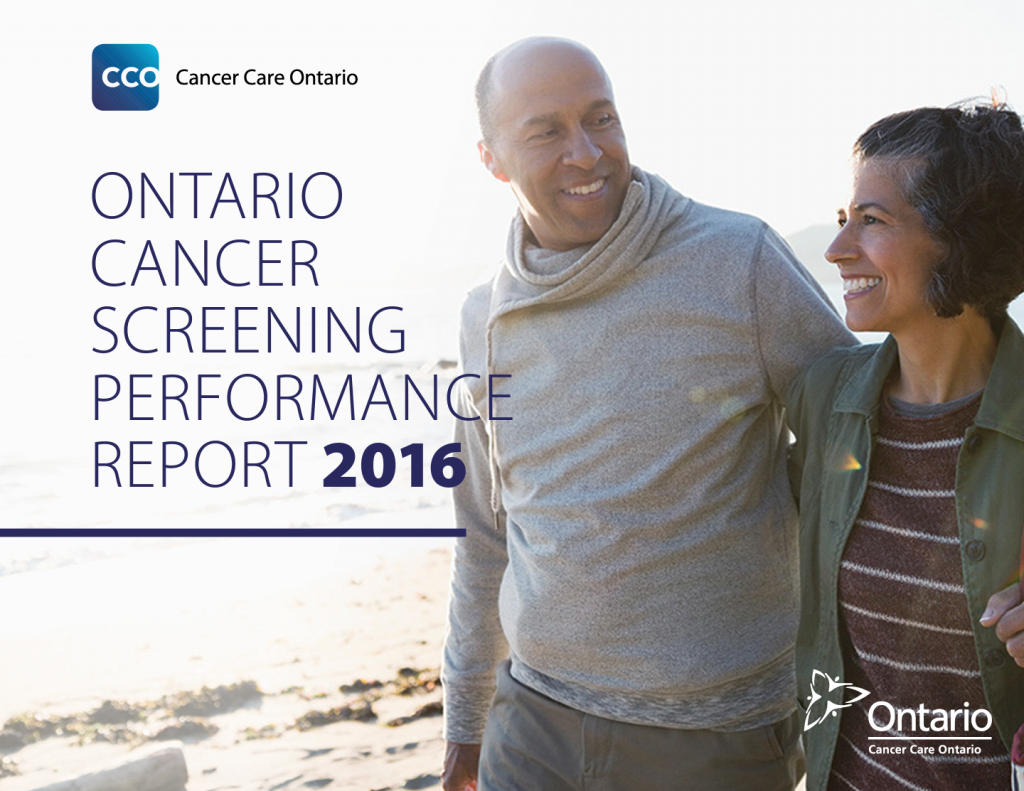New Report Shows Cancer Screening Participation Could Improve
by Sara Chow
 The Ontario Cancer Screening Performance Report 2016 evaluates the performance of the province’s three organized cancer screening programs: the Ontario Breast Screening Program (OBSP), the Ontario Cervical Screening Program (OCSP) and ColonCancerCheck (CCC). It highlights cancer screening participation and retention, future program directions and also includes a feature on Ontarians who are overdue for screening.
The Ontario Cancer Screening Performance Report 2016 evaluates the performance of the province’s three organized cancer screening programs: the Ontario Breast Screening Program (OBSP), the Ontario Cervical Screening Program (OCSP) and ColonCancerCheck (CCC). It highlights cancer screening participation and retention, future program directions and also includes a feature on Ontarians who are overdue for screening.Cancer Care Ontario releases Ontario Cancer Screening Performance Report 2016
The number of people newly diagnosed with cancer in Ontario has increased over the last two decades and will continue to rise, largely due to an aging population. Certain cancers can be prevented or detected earlier by regular screening, but according to a new report released today by Cancer Care Ontario, many eligible Ontarians aren’t up-to-date with their screening tests.
The Ontario Cancer Screening Performance Report 2016 evaluates the performance of the province’s three organized cancer screening programs: the Ontario Breast Screening Program (OBSP), the Ontario Cervical Screening Program (OCSP) and ColonCancerCheck (CCC). It highlights cancer screening participation and retention, future program directions and also includes a feature on Ontarians who are overdue for screening.
“Screening detects pre-cancerous changes or cancers at an early stage when they are easier to treat,” says Dr. Mark Henderson, Executive Vice President, Patient Services at Thunder Bay Regional Health Sciences Centre and Regional Vice President, Cancer Care Ontario. “That’s why we are encouraging everyone to find out if they are eligible for screening and either talk to their health care provider about it, or in the case of the Ontario Breast Screening Program, women can self-refer.”
The report identifies some areas for improvement in the Northwest. Specifically, the report shows that we can improve participation in breast, cervical and colorectal cancer screening. Based on 2014 participation rates, only 62.6 percent of women are up-to-date with breast cancer screening, 60.5 percent are up-to-date with cervical screening and 44 percent of adults, between the ages of 50 and 74 years, are overdue for colorectal cancer screening. Furthermore, the report also highlights that we need to encourage people to complete their follow-up when it is required after completing a screening test.
“Just as it is important to complete your regular cancer screening, it is also important that you complete follow-up tests when it is required,” explains Dr. Henderson. “In our region, the number of incomplete follow-ups that we are seeing demonstrates the need to encourage individuals to take the next step in their care when it is required. Currently, Ontarians who participate in the province’s organized cancer screening programs receive an invitation letter to get screened, and then after they complete their screening they also receive a result letter which indicates if follow-up is required.”
The report also reveals successes in cancer screening participation rates. Despite our region having the highest number of eligible adults overdue for colorectal cancer screening, we also had the greatest improvement in participation, decreasing the percentage overdue by 13 percent.
Other significant results include:
- Participation in breast cancer screening has remained stable at 65 percent of eligible women since 2011–2012. However, the proportion of women who get screened within the OBSP (as opposed to getting screened outside of the OBSP) has continued to increase, up to 78 percent in 2013–2014.
- Participation and retention in cervical cancer screening has declined from 2009-2011 (68 percent) to 2012–2014 (63 percent). However, these decreases may be related to changes in screening guidelines which extended the recommended screening interval from annually to once every three years.
- The proportion of eligible Ontarians who are overdue for colorectal cancer screening has continued to improve (decline) from 50 percent in 2008 to 40 percent in 2014. Cancer Care Ontario will be transitioning to a new screening test for colorectal cancer for average risk individuals (the fecal immunochemical test), which we anticipate will improve screening participation.
The findings in this report will be used to inform evidence-based and locally relevant strategies to strengthen cancer screening in Ontario. “We are continually working to improve our cancer screening rates in our region. This report can help to highlight where we should focus our efforts,” said Dr. Henderson. “In the last year we have made improvements, such as: expanding the number of Indigenous communities that the Screen for Life Coach visits during the travel season; affiliating all screening mammography services in our region with the Ontario Breast Screening Program (Sioux Lookout’s Meno Ya Win Health Centre affiliated this past summer); and working to enroll primary care physicians with a reporting system that identifies when patients are due for screening.”
A copy of the Ontario Cancer Screening Performance Report 2016 is available at cancercare.on.ca/cancerscreeningreport.
For more information, please contact:
Sara Chow
Health Promotion & Communications Planner
Prevention & Screening Services
Thunder Bay Regional Health Sciences Centre
(807) 684-6716
chows@tbh.net